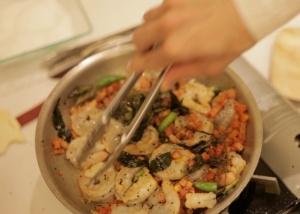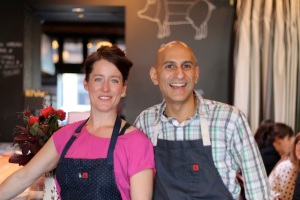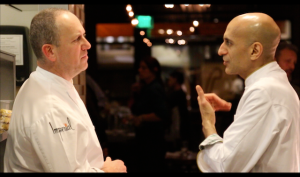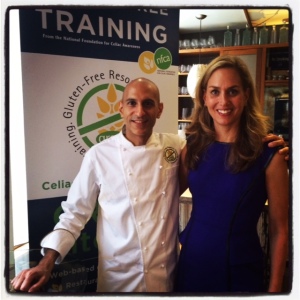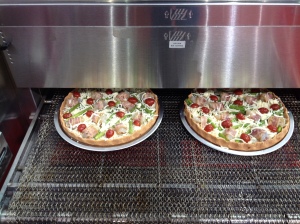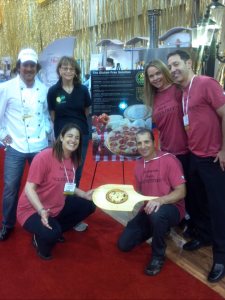Posts tagged ‘cross-contamination’
Portland: A Booming Foodie Community
After a wonderful kickoff in New York City, the National Foundation for Celiac Awareness’ (NFCA) GREAT Kitchens team headed to Portland this week for the second leg of the Gluten-Free Chef’s Table tour. Upon entering the city, Beckee Moreland, NFCA’s Director of Gluten-Free Industry Initiatives and Chef Ambassador Jehangir Mehta, were greeted with unseasonably warm weather and a full schedule of activities.
The first day began Monday, October 28 at the International Foodservice Editorial Council’s (IFEC) Annual Conference. IFEC brings foodservice media, communicators and retail food product companies together to discuss food trends, what food topics will be written about in 2014 and provides companies with a chance to introduce their brand/product/service to some of the foodservice community’s most influential individuals. As a part of the conference’s welcome reception, the GREAT Kitchens Chef’s Table Tour presented a delicious gluten-free dish, masterfully created by Chef Mehta, to attendees as they arrived. The dish, an onion-seed shrimp wrap, proved to attendees that safe, gluten-free food can be complex, full of flavor, delicious and prepared properly with no cross-contact worries.
Guests from publications like Nation’s Restaurant News and Campus Dining Today stopped by the table to discuss the GREAT Kitchens gluten-free training program for both restaurants and universities, as well as the purpose of the educational tour. Also, organizations like the National Pork Board and brands like Chobani stopped by to discuss gluten-free options and recipes. As NFCA engaged in ongoing conversations with media/organizations in Portland, the GREAT Kitchens team encountered that Portland restaurants/individuals have increasingly embraced serving customer’s dietary needs, including a booming interest in gluten-free offerings. With that, the team set out to educate Portland restaurants/foodservice establishments on the need for proper gluten-free training to ensure that those with celiac disease or gluten sensitivity have access to safe gluten-free options when dining out.
On Tuesday, October 29, the GREAT Kitchens team headed to its first restaurant event, held at Beast in Portland. Beast is owned by Naomi Pomeroy, a chef you may recognize from Top Chef Masters. Chef Naomi opened her doors for a private luncheon specifically for Portland/national food and health media and bloggers, including Portland Monthly and the Portland Business Journal to name a few. The luncheon began with a brief introduction to GREAT Kitchens and the NFCA before heading into a four course gluten-free meal, prepared exclusively for the group by Chef Naomi and Chef Jehangir.
The meal began with butternut squash velouté with fried herbs and creme fraiche created by Chef Naomi, followed by a delicious chicory and apple salad with a brown butter & sherry vinaigrette. While guests sampled their meal, Chef Mehta prepared a cumin red snapper with shishito, beet and a chickpea onion ring. For individuals with celiac, often they go without food like onion rings because of ingredients and access to a dedicated fryer. For this meal, Chef Jehangir created a dedicated frying pot and used a chickpea flour to make the batter gluten-free. For dessert, Chef Naomi created Quince and Frangipane Galette with lemon verbena ice cream. The full meal was a great opportunity to showcase to media that creating delicious gluten-free food does not mean you have to compromise on flavor or technique. In addition, some of the best feedback that was received was how receptive attendees were to supporting NFCA’s mission of making safe gluten-free food for those with celiac disease or gluten sensitivity in Portland.
Throughout the meal, Chef Naomi and Chef Jehangir both went into detail about exchanging ingredients in their restaurants to serve a gluten-free customer safely. The event truly was a great success and provided the opportunity for media/bloggers in Portland to ask one-on-one questions about celiac disease and accessibility for gluten-free foods in restaurant and retail environments.
The second event on Tuesday was a media/blogger event at Imperial by Vitaly Paley. Chef Vitaly is very well-known in the Portland community, particularly because of his interest in keeping menu items truly farm-to-table, enabling the opportunity for guests to try new items based on seasonality or availability of produce. National foodservice media such as Plate Magazine and Portland media/bloggers came out to celebrate and learn about the tour and indulge in a gluten-free tasting menu. Chef Vitaly overdid himself but creating unique dishes like puffed sorghum (sourced from Bob’s Red Mill), a slow-braised veal and a delicious icebox cake. Chef Vitaly also provided the group the unique opportunity to taste a limited offering of sorghum whiskey that he was commissioned to create earlier in the year. The stop garnered more 20 guests, all of which are influencers in the Portland market. Chef Paley recently released a new menu with gluten-free menu items, as well as added a new grill that will remain free of gluten, and believes executing the proper training is the only way for staff to truly understand the proper protocols for serving the gluten-free guest. It was a GREAT night!
The two restaurant events were a huge success. We look forward to reading the recaps of the evening in the blogs/publications in attendance.
October 30th started off with the opportunity for NFCA to participate in a KATU-TV segment that addresses the gluten-free diner in Portland. Beckee Moreland talked to KATU’s Valerie Hurst about her experience as a gluten-free consumer at a restaurant and went through a menu, discussing questions she asks during a restaurant experience, including ingredients and kitchen protocols. Chef Vitaly also participated in the segment, showcasing his gluten-free menu and sharing his thoughts on the importance of serving all customers in his restaurants, including those with dietary restrictions or celiac disease.
The last event we participated in was a trip to Portland State University. With students and the foodservice staff equally excited for gluten-free options, Chef Mehta cooked alongside Chef Matt Kemp from PSU. Jehangir created a shrimp wrap that was a huge hit by students, who lined up outside his station beginning at 11:00 a.m., with some grabbing 2-3 for their plate. While on campus, the NFCA team had the opportunity to speak with Portland State students with celiac disease and were excited to hear the strides that Portland State are taking to serve these student’s needs. With a “worry-free” station that includes gluten-free, dairy-free, peanut-free items, students are given the opportunity to have safe, gluten-free dishes. Although a limited selection according to students, the university is making strides in increasing its offerings and the staff is passionate about being accommodating to all students. We look forward to the opportunity to work with Portland State in the future through our GREAT Kitchens training program.
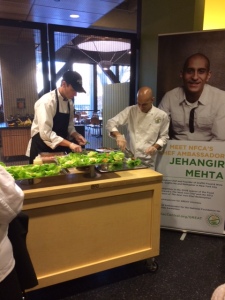
Chef Matt Kemp of Portland State University preparing gluten-free dishes for the PSU students with Chef Mehta.
Overall, Portland was a great example of a city taking the right steps in serving the gluten-free consumer, including businesses like Petunia’s and Tula’s, two gluten-free bakeries that NFCA visited while in the city. With dedicated bakeries and other restaurants increasing gluten-free offerings, NFCA found that Portland is in the forefront of making the necessary steps to increase options for people living with celiac disease or gluten sensitivity.
On to the next stop: Seattle!
– The GREAT Kitchens Gluten-Free Chef’s Table Tour team
P.S. Follow the tour on Facebook or by following the hashtags #GREATKitchens or #GFChefsTable on Twitter. We’re posting lots of photos from the road on Instagram, too!
GREAT Kitchens Gluten-Free Chef’s Table Tour: Stop #1 at Mehtaphor in New York City
The GREAT Kitchens Gluten-Free Chef’s Table Tour has officially started! The National Foundation for Celiac Awareness (NFCA) kicked off the tour at Chef Jehangir Mehta’s New York City restaurant, Mehtaphor, yesterday afternoon.
Gluten-free bloggers, food bloggers and reporters from the New York area came out to enjoy a 100% gluten-free lunch with us at Mehtaphor. And while I was excited to eat all of Chef Mehta’s gluten-free dishes (which, by the way, were fabulous), I was even more excited to have the opportunity to talk about the need for safe gluten-free food preparation. We even proved one of my favorite points – gluten-free does not mean taste free! There were no gluten-free bread or pasta substitutes on the menu, but rather Chef Mehta focused on serving a Mediterranean-style meal that left everyone completely satisfied (quite to the surprise of some of the attendees!). If ever there was a perfect meal to satisfy gluten-free and non-gluten-free eaters, this meal was it.
While we enjoyed Chef Mehta’s dishes, we all had the chance to chat about celiac disease and the medical aspect behind the gluten-free diet. Most of the attendees had some sort of connection to celiac disease or non-celiac gluten sensitivity (‘gluten sensitivity’). Some had a deep understanding of gluten-related disorders while others were still learning, which made for an incredibly diverse conversation. If there’s one thing I love, it’s raising awareness of an autoimmune disease that is still vastly underdiagnosed.
I have to admit, I was truly touched by the interest of the folks who attended yesterday’s luncheon. Sure, there was delicious gluten-free food to enjoy, but everyone was genuinely interested in learning about celiac disease and the GREAT Kitchens program. They wanted to understand why this online gluten-free training program exists and how much of a difference training makes for people living with celiac disease and other gluten-related disorders. Everyone was engaged with the program, asked a lot of questions and, to put it simply, they cared.
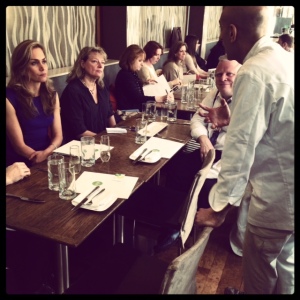
Chef Mehta did an amazing job of explaining why safe gluten-free cooking is a must for our community!
To all those who attended the luncheon – thank you so much for recognizing the need for people living with gluten-related disorders to have access to not just gluten-free meals, but meals that are safe and free from cross-contamination.
Today, Chef Mehta and I hung out at New York University (NYU) to serve gluten-free dishes to students in the Weinstein Dining Hall. There are some photos from the event on NFCA’s Instagram account you can check out now. Keep an eye on the blog for more updates from today’s stop and the rest of the tour. If you are on Twitter, follow NFCA (@CeliacAwareness) and Chef Mehta (@jehangir_mehta) to get the play-by-play of the tour. You can follow me as well at @abast. We’re using the hashtags #GREATKitchens and #GFChefsTable, so feel free to jump in the conversation!
– Alice
P.S. You can find more pictures from the tour on NFCA’s Facebook page. We’ll be updating the album at each stop on the tour.
GREAT Kitchens Gluten-Free Chef’s Table Tour – Coming to a City Near You!
 The National Foundation for Celiac Awareness (NFCA) is proud to call Chef Jehangir Mehta, a finalist on the popular Next Iron Chef series, a partner in creating safe gluten-free options in restaurants so people living with gluten-related disorders can eat without fear.
The National Foundation for Celiac Awareness (NFCA) is proud to call Chef Jehangir Mehta, a finalist on the popular Next Iron Chef series, a partner in creating safe gluten-free options in restaurants so people living with gluten-related disorders can eat without fear.
NFCA team members and Chef Mehta will be taking NFCA’s online gluten-free cooking program on the road over the next six months. Introducing the GREAT Kitchens Gluten-Free Chef’s Table Tour! The tour will cover 10 cities with the goal of educating chefs nationwide on the need for gluten-free menu items that go beyond just using gluten-free ingredients. It is amazing to see gluten-free options popping up on menus across the country, but unless restaurants are educated on the importance of safe gluten-free food preparation, our community cannot dine safely.
Many things have changed in the 20+ years that I have been diagnosed with celiac disease. When I was diagnosed, gluten-free food was not even available in the U.S. Today, we have access to a wide range of gluten-free food, but the next step on our journey is ensuring all gluten-free food is safe for our community. A gluten-free diet is the only treatment for people living with celiac disease; there are currently no pills, vaccines or cures for celiac disease. Research is taking us closer, but for now, we have to ensure the people living with this autoimmune disease can have access to the food that is our only medicine.
It has been 10 years since NFCA first opened its doors and set out on its mission to raise celiac disease awareness and improve the quality of life for those on a lifelong gluten-free diet. In that time, I have met many chefs and foodservice industry professionals eager to understand celiac disease, the gluten-free diet and our need for food to be free from gluten-containing ingredients and the gluten that can enter our food through cross-contact (commonly referred to as cross-contamination by the gluten-free community). These professionals are eager to accommodate their guests, but first they have to know training and resources are available to help.
NFCA’s GREAT Kitchens program gives restaurant employees from the wait staff to the chefs the tools they need to serve safe gluten-free food. Our ten city tour will help spread  the message that for the 3 million Americans living with celiac disease, a gluten-free diet is not a fad, but the only way to restore their health and reclaim their lives. Ranging from cities like New York, Chicago and San Francisco, we will be working with executive chefs in some of the best restaurants – complete with gluten-free cooking demonstrations, of course!
the message that for the 3 million Americans living with celiac disease, a gluten-free diet is not a fad, but the only way to restore their health and reclaim their lives. Ranging from cities like New York, Chicago and San Francisco, we will be working with executive chefs in some of the best restaurants – complete with gluten-free cooking demonstrations, of course!
Stay tuned as we start the journey at Chef Mehta’s Tribeca restaurant, Mehtaphor on Tuesday, October 22. Follow the tour by liking NFCA’s Facebook page and following NFCA on Twitter (@CeliacAwareness) and Instagram (@CeliacCentral). Chef Mehta will also be live tweeting from the road. Follow him at @jehangir_mehta.
To our GREAT health,
Alice
Playing a Role in Research: Celiac Disease Drug Development & the Drug Information Association
Last month I had the honor of participating in the Drug Information Association’s (DIA) 49th Annual Meeting as a 2013 DIA Patient Advocate Fellow.
Because the gluten-free diet is currently the only treatment for celiac disease, some of you may be curious as to why I was interested in attending a meeting focused on the pharmaceutical industry and regulatory sciences.
Today we know that the gluten-free diet isn’t perfect – cross-contamination, isolation, constant fear of being gluten-ed, worry about finding a safe meal when dining out or traveling, the list could go on.
But these truths have not always been recognized or established.
Celiac disease was once considered a rare childhood condition that could be wholly treated by eliminating dietary gluten and these misconceptions significantly hindered research into pharmaceutical therapies for decades.
As one of the most commonly occurring lifelong genetically-determined diseases with an increased risk of health complications such as bone disease, infertility and intestinal and bowel cancers if left untreated, it is critical that celiac disease be recognized as a chronic condition worthy of the pharmaceutical industry’s attention.
Although a pharmaceutical treatment is absent from today’s market, it is exciting to have three treatments currently undergoing clinical trials in the US, each offering the patient population a unique solution for their celiac disease.
As these trials, and hopefully one day others, progress, it is essential that celiac disease patient advocacy organizations know how to navigate the pharmaceutical industry and the regulatory science field. An alternative treatment for celiac disease is no longer a hope but a reality and patients must learn about their important role in scientific research, how drugs are discovered and developed, and how clinical trials are conducted. In this case, knowledge is truly power.
A sincere thanks to Donna Mayer, the DIA Board of Directors, the 2013 Fellows, DIA Fellow Alumni, and the many professionals involved in the selection process and planning of this year’s meeting. It was a transformative experience and an incredible learning opportunity and I look forward to applying my new found knowledge to my work as a health communications professional.
Want more info?
Stay on top of the latest news in the world of celiac disease drug development and clinical trials by visiting NFCA’s new web section on these very topics.
Learn more about DIA and the DIA Patient Advocate Fellow Program.
– Kristin
Gluten-Free, Miami and Me
I don’t know how many of you are like me but when I travel, I pack most of my food with me so that I know exactly what I am eating at all times. That usually means one suitcase full of food including my handy Magic Bullet for my morning gluten-free shake. But a few weeks ago, I was off to South Florida with the National Foundation for Celiac Awareness (NFCA) team and there was no room for all of my food. This made me a little nervous, but I knew that I could manage this trip because of all the additional knowledge I’ve gained from working with NFCA. Plus, everyone I would be meeting would be gluten-free, so how hard could it be?
The flight down wasn’t too bad since I had armed myself with ThinkThin bars (there’s always 2 in my bag) and bottled water. By the time I checked into the hotel, it was so late there was no need to eat. The next morning, I took another bar and water with me for breakfast and was off to visit a member of our Gluten-Free South Florida Group. We spent time talking and sharing our stories of diagnosis- guess who else travels with food? Isn’t it a great feeling when you realize you are not alone in your pursuit of gluten-free food and desire not to be cross-contaminated? It’s like a big hug from the world telling you it will all be okay.
Dinner worked out well that evening at Seasons 52, a restaurant that had a gluten-free menu. Even though they are a chain restaurant, I went with another member of the South Florida Gluten-Free Group who has eaten there many times and felt safe in her recommendation. Plus, I was starving!
The following day was literally a GREAT day. Alice Bast, NFCA’s Founder, was invited to speak at a country club in Gulfstream, Florida. They were trained by NFCA’s Gluten-Free Resource Education and Awareness Training (GREAT) Kitchens program, so the entire meal was gluten-free and I felt confident the chefs understood safe gluten-free food preparation. If any of you have heard Alice speak, you know that she is dynamic in her presentation and her passion for celiac and gluten-sensitivity radiates from her inner core. The crowd of more than 100 was in tune with gluten-free and more than half knew about celiac disease or are personally affected by this autoimmune disorder. They all had such amazing questions and were engaged throughout the evening. Most of the guests were also shocked at how delicious the gluten-free meal was and the flour-less chocolate torte was exquisite! It was so great to be surrounded by people who understood the need for safe (and tasty!) gluten-free food.
My final day, I visited with a doctor who has non-celiac gluten sensitivity. We met at his home where he made me a fabulous gluten-free grilled cheese on Udi’s bread. Oh, and truth- we split a gluten-free chocolate bar. After talking for three hours about all things gluten-free and NFCA, I had to go or I would have made myself at home for dinner.
Now what is it that I want you to take away from my trip south? I survived and thrived without a full suitcase of food. We have an amazing and inspirational community that I am fortunate to meet on my travels and in the Philadelphia region. All of you teach me something new in our conversations and emails. I leave tonight for overseas…with just 3 bags of gluten-free food. I’m not scared, I’m confident. But I wouldn’t be if I hadn’t found NFCA and the amazing gluten-free community. Thank you for giving me my wings back.
– Kimberly
Traveling Gluten-Free: What I’ve Learned in 3 Years
I’ve become quite an expert at traveling. As Director of Gluten-Free Industry Initiatives for the National Foundation for Celiac Awareness (NFCA), I’ve visited over 25 cities and worked in a dozen or more states within three years (my latest NFCA trip was to Atlanta, Georgia two weeks ago for the KeHE Summer Selling Show). I can maneuver through airport security with ease and efficiency, flipping off shoes and jackets and pulling out bags of liquids and my laptop in seconds. And since I have celiac disease, traveling means “always being prepared and aware” so I’ve created a list of “must-haves” snacks, which airports have safe choices and how to find gluten-free friendly and not so friendly restaurants anywhere in the country. (I use the Find Me Gluten-Free app to sort out potential eateries. This is a dining locator not an endorsement of gluten-free options. You still need to investigate by reading the reviews, making a call and asking questions.) I’ve also had to be proactive and advocate for myself and others with gluten-related disorders when it comes to attending business dinners, conferences and events by identifying my dietary needs on conference registration forms, plus notifying event coordinators, hotel hospitality and general managers.
This is all part of trip preparation. It takes a bit more time but I always feel it’s important to be an advocate for not only myself but for all people with gluten-related disorders. And while I’m traveling around the country, I feel it is my job and honor to be the voice for people with celiac disease everywhere by spreading education, awareness and understanding. (You may not want to sit next to me on a plane…you’ll get an earful.) I have learned that if we don’t politely ask, people may not think our dietary needs are necessary. If we don’t carefully express our needs, many may not think there are any. If we don’t calmly mention the mistake, serves and restaurants will never know there is a problem. If we don’t ask if they have completed NFCA’s GREAT Kitchens gluten-free training program, restaurant operators, chefs and servers may not think they need it. But, if we remain patient and plant the seed, the growth will come.
Here is my list of must-have gluten-free snacks to take with me on the go:
- KIND bars
- Gluten-free crackers (If you keep these in a tin, they’re perfect for packing in a suitcase)
- Individual servings of hummus and nut butter
- Fruit
- Jerky sticks
- Cheese sticks
- Mix nuts, dried fruit, gluten-free pretzels or chocolate chips
- Go Picnic boxes (Not everything by Go Picnic is gluten-free, so be sure to check before purchasing)
I’m always looking for new travel-friendly gluten-free foods. Comment below with your go-to travel snack to give me some fresh ideas!
– Beckee
Why Can’t I Just Go Gluten-Free On My Own?
Researchers from the Celiac Center at Beth Israel Deaconess Medical Center in Boston have published a new paper on the gluten challenge. Late last week NFCA covered the recent publication in our Research News Feed – you can check out the post here.
Many are familiar with the gluten challenge as it relates to the current hot topic (or dare I say, trend?) of self-diagnosis and the implications that come along with going gluten-free before being tested for celiac disease. People often equate the words “gluten challenge” with the sentiment, “Why would I put my body through torture if I know what unpleasant symptoms to expect?” I can certainly understand this perspective as I tend to suffer from a range of unwelcome digestive disturbances when gluten has a found a way into my diet.
But, I thought I’d take this opportunity to also share my personal views on why I believe an official diagnosis of celiac disease is so crucial, both for an individual’s health and the greater field of gluten-related disorders at large. I’ve actually covered this topic before, in the early days of Celiac Central: Bits and Bites. As you can see, I feel strongly about this particular subject.
1. Expert guidance!
Celiac disease is an autoimmune disorder requiring expert management and follow-up by a knowledgeable physician. Clinicians can closely monitor a patient with celiac disease to ensure that their celiac antibodies (blood work) return to normal and can keep an eye out for unrelenting symptoms that may indicate a need for additional testing or require supplementary treatment. A dietitian skilled in the gluten-free diet can ensure that individuals with celiac disease are meeting all of their nutritional requirements and can also assist in weight management, a challenge that in recent years researchers have identified as an important topic to discuss in celiac disease management. Registered dietitians or nutritionists can also use their expertise to determine if a patient is being accidentally exposed to gluten through routes such as misinterpreted ingredient labels or cross-contamination in the home or when dining out. (Did you know that gluten exposure is the most common cause of non-responsive celiac disease?) It’s important that people understand that the gluten-free diet is complicated and requires guidance. Relying on the internet and library books alone is no replacement for a healthcare provider.
2. More expert guidance.
What’s more, if celiac disease is not properly treated or managed, a person is at risk for developing other health complications involving their bone and reproductive health, as well as some cancers. Of course, there is also the chance that a person who has implemented a gluten-free diet because they think celiac disease is the culprit, may actually not have a gluten-related disorder at all and instead have a different underlying (and untreated) condition. Just as celiac disease can mimic the symptoms of other conditions, so too can other conditions mimic the symptoms of celiac disease. For more information on this, see this handout from Quest Diagnostics: Why Not Just Go Gluten-Free?
3. It applies to your family, too.
Further, celiac disease is genetic, which means that it often runs in families. Persons who have a first or second-degree relative (i.e. parents, siblings, aunts, uncles, cousins, grandparents) diagnosed with celiac disease need to be tested for the autoimmune condition as well. It’s particularly important that family members of people with celiac disease understand that they don’t have to have the same symptoms as their relative, or in fact, any at all, in order to have celiac disease.
4. We need collaboration.
Research in the field of celiac disease and other gluten-related disorders has grown exponentially in the last decade regarding subject matters such as disease signs and symptoms and the role of the gluten-free diet. However, one puzzle piece that remains missing is the number of undiagnosed versus diagnosed patients. Sure, many estimates abound but let’s face it – these are only estimates. It is difficult to ensure that persons are accurately diagnosed and managed if they are treating a disease on their own. In order to successfully advance treatment and testing, we need the assistance of the patient population.
It’s great to see people taking responsibility for their health and implementing what they believe to be a healthy lifestyle, but I think that it’s just as important that patients recognize the important role medical providers play in the management of their health. If your current physician has refused to test you for celiac disease, don’t stop there. You can share NFCA’s free Primary Care CME with them or seek out an experienced clinician. Ask support group members for a referral and read local articles about celiac disease to see which healthcare providers are considered experts in your area.
If I haven’t convinced you to consider an official diagnosis, then I at least ask you to understand the reality of having to undergo a gluten challenge if and when you decide to consult with your physician. In other words, know what you’re getting into before you go gluten-free on your own.
I welcome an improved gluten challenge like the approach Dr. Leffler and his colleagues have studied. I expect that this new approach will bring about improved patient compliance and willingness to undergo a gluten challenge, and hope that other clinicians begin implementing this approach too.
-Kristin

